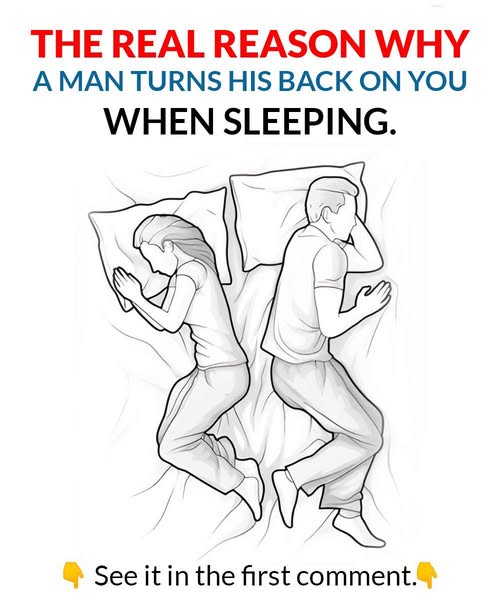Skip to content
🛌 Why? You should have known this sooner.

It Might Mean More Than You Think…
🔍 1. Comfort & Habit
- Explanation: For many people, sleeping on their side or with their back turned is simply the most comfortable position.
- Detail: It may have nothing to do with you or your relationship. This could be the way he’s slept for years—even before being in a relationship.
- Summary: Not necessarily emotional distance—just physical comfort.
❤️ 2. Emotional Space or Processing
- Explanation: Sometimes, people turn away during sleep when they’re dealing with stress, anxiety, or emotional overwhelm.
- Detail: If he’s experiencing tension at work or is deep in thought, he might turn his back as a form of quiet processing.
- Summary: It may not be about you, but rather his internal emotional state.
💬 3. Unspoken Issues in the Relationship
- Explanation: If he used to cuddle or face you and has recently started turning away, this change could be a signal.
- Detail: It might mean there’s unresolved conflict, resentment, or emotional disconnection.
- Summary: Observe patterns and communicate gently if this change is concerning.
😴 4. Need for Personal Space During Sleep
- Explanation: Some people require more space and freedom to sleep soundly.
- Detail: Turning his back may be a way to avoid feeling “trapped” or too warm during the night.
- Summary: It’s not rejection—it’s about sleep quality.
💑 5. Level of Relationship Intimacy
- Explanation: Couples who are extremely secure often feel comfortable enough to sleep facing away from each other.
- Detail: Studies show that turning backs in bed doesn’t necessarily mean emotional distance—it could actually mean trust and comfort.
- Summary: Distance in sleep = independence, not necessarily disconnection.
😕 6. Physical or Medical Reasons
- Explanation: He might be dealing with back pain, shoulder pain, acid reflux, or even snoring issues.
- Detail: Sleeping in certain positions can reduce symptoms, making turning away a health choice.
- Summary: It might just be about his physical health—not emotions.
🧠 What You Should Do:
- Don’t jump to conclusions based on sleeping position alone.
- If you’re concerned, talk openly and kindly. Ask if he’s okay, and share how you feel.
